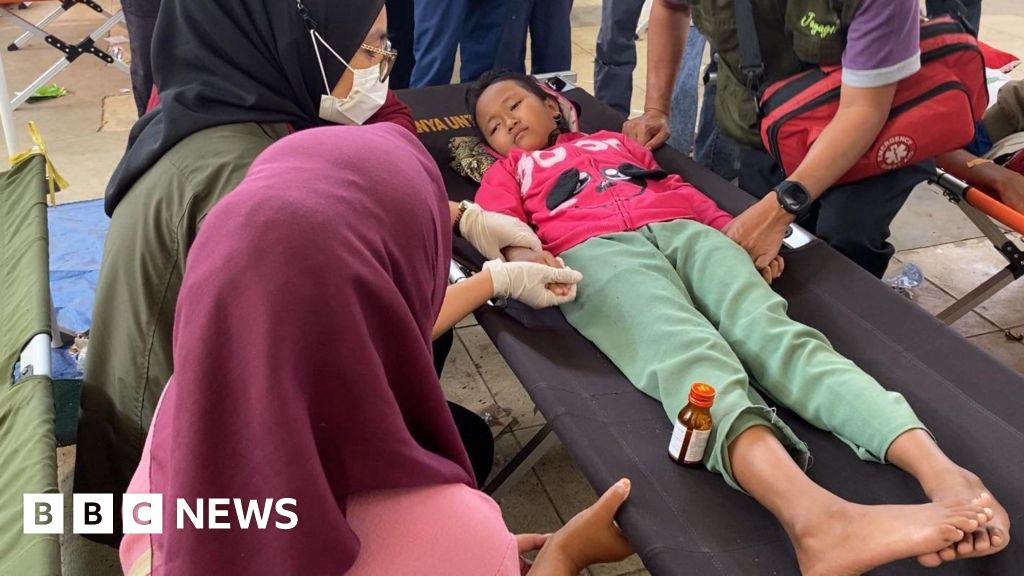Health
Over 1,000 Indonesian Children Fall Ill from School Lunches

More than 1,000 children in Indonesia have fallen ill after consuming free school lunches, with health authorities reporting a total of 1,171 poisoning cases recorded between Monday and Wednesday. This alarming incident forms part of a troubling trend linked to President Prabowo Subianto‘s multi-billion-dollar nutritious meals programme, which aims to provide free lunches for 80 million students across the country.
According to Yuyun Sarihotima, the head of West Java’s Cipongkor Community Health Center, the outbreaks follow a similar incident last week, where approximately 800 students were affected in West Java and Central Sulawesi. The programme, which has become a signature initiative of President Prabowo, is now facing increasing scrutiny from non-governmental organizations that are calling for its suspension due to health concerns.
In a statement on Wednesday, Muhaimin Iskandar, Coordinating Minister for Community Empowerment, clarified that there are “no plans to stop it.” The recent victims exhibited symptoms including stomach aches, dizziness, nausea, and shortness of breath, the latter being an unusual symptom for food poisoning. Previous incidents have suggested that negligent food preparation might be the root cause of such outbreaks.
Victims reported consuming meals that included soy sauce chicken, fried tofu, vegetables, and fruit. Earlier poisoning incidents had been linked to expired sauces and, in one case, fried shark. The head of Indonesia’s National Nutrition Agency, Dadan Hindayana, confirmed that the mass poisoning in Cipongkor was due to a technical error from the Nutrition Fulfillment Service Unit (SPPG). Operations at the SPPG in Cipongkor have reportedly been suspended as a precaution.
The situation escalated quickly, with the first suspected cases arising on Monday, leading to around 475 students falling ill. By Wednesday, this figure rose dramatically, with another outbreak affecting up to 500 students. The National Narcotics Agency (BGN) reported that from January to September 22, there were 4,711 cases of food poisoning linked to the free school lunch programme, predominantly on the island of Java. In contrast, the Indonesian Education Monitoring Network (JPPI) recorded an even higher figure, stating that by September 21, the number of affected children had surged to 6,452.
JPPI National Coordinator Ubaid Matraji urged the government to declare an outbreak and temporarily halt the programme for a comprehensive evaluation. Some propose that funds for the meals be distributed directly to parents, enabling them to prepare food at home; however, this suggestion has been rejected by the BGN.
Globally, free meal programmes have shown effectiveness in improving children’s health, academic performance, and school attendance. Yet, Indonesia’s initiative, which is estimated to cost around $28 billion, is now at the center of food safety concerns and rising public dissent. The programme was a key element of Prabowo’s presidential campaign in 2023, intended to address stunting, a malnutrition-related condition affecting one in five children under five in Indonesia.
“Through this initiative, our children will grow taller and emerge as champions,” Prabowo stated during his campaign. Following his inauguration last October, the programme has played a significant role in bolstering his popularity, with approval ratings reaching 80% after his first 100 days in office.
Since its launch in January, the programme has reached approximately 550,000 students across 26 provinces. While the initiative is deemed “well-intentioned,” experts like Maria Monica Wihardja from the ISEAS-Yusof Ishak Institute have noted a lack of evidence indicating widespread need for free school meals. A national survey conducted in 2024 found that less than 1% of Indonesian households went without meals for a day in the past year.
The financial implications of the programme raise further concerns. Indonesia has allocated over $10 billion for the free school meals this year, a stark contrast to India’s expenditure of $1.5 billion to feed 120 million children in the world’s largest such initiative. Brazil’s programme, which serves about 40 million students, is similarly funded at a comparable level.
Defenders of the initiative argue that it has been approved in the already-passed 2026 State Budget. Nonetheless, experts warn that the substantial budget might invite corruption, as large-scale social assistance programmes in Indonesia have historically been plagued by such issues. “Given the sheer size of the budget,” said Muhammad Rafi Bakri, a research analyst at Indonesia’s audit board, “this program is a goldmine for corrupt officials.”
With public health at stake and mounting pressure from civil society, the future of Indonesia’s free school meals programme now hangs in the balance.
-

 World5 months ago
World5 months agoSouth Korea’s Foreign Minister Cho Hyun to Visit China This Week
-

 Business5 months ago
Business5 months agoStarling Bank Plans Secondary Share Sale, Targeting $5.4 Billion Valuation
-

 Top Stories5 months ago
Top Stories5 months agoMunsang College Celebrates 100 Years with Grand Ceremony
-

 World5 months ago
World5 months agoPAS Aims to Expand Parliamentary Influence in Upcoming Election
-

 Business7 months ago
Business7 months agoKenvue Dismisses CEO Thibaut Mongon as Strategic Review Advances
-

 Lifestyle6 months ago
Lifestyle6 months agoHumanism Camp Engages 250 Youths in Summer Fest 2025
-

 Sports6 months ago
Sports6 months agoDe Minaur Triumphs at Washington Open After Thrilling Comeback
-

 Sports7 months ago
Sports7 months agoTupou and Daugunu Join First Nations Squad for Lions Clash
-

 Top Stories7 months ago
Top Stories7 months agoColombian Senator Miguel Uribe Shows Signs of Recovery After Attack
-

 World7 months ago
World7 months agoASEAN Gears Up for Historic Joint Meeting of Foreign and Economic Ministers
-

 Health6 months ago
Health6 months agoNew Study Challenges Assumptions About Aging and Inflammation
-

 Business7 months ago
Business7 months agoOil Prices Surge Following New EU Sanctions on Russia









